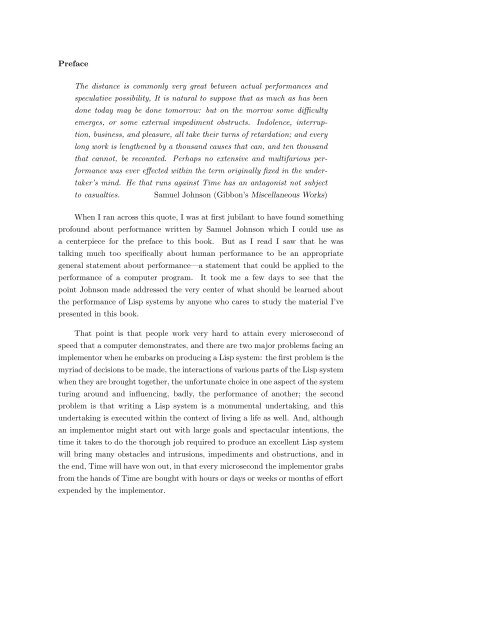- Page 1: Performance and Evaluation of Lisp
- Page 5 and 6: Acknowledgements This book is reall
- Page 7 and 8: Contents Chapter 1 Introduction . .
- Page 9 and 10: Performance and Evaluation of Lisp
- Page 11 and 12: 2 to be a plethora of facts, only t
- Page 13 and 14: 4 An instruction pipeline is used t
- Page 15 and 16: 6 to assign any location the name o
- Page 17 and 18: 8 voking a closure) can be accompli
- Page 19 and 20: 10 (Lisp machine, SEUS [Weyhrauch 1
- Page 21 and 22: 12 which takes a function with some
- Page 23 and 24: 14 free objects or until a threshol
- Page 25 and 26: 16 1.1.2.6 Arithmetic Arithmetic is
- Page 27 and 28: 18 Different rounding modes in the
- Page 29 and 30: 20 1.3 Major Lisp Facilities There
- Page 31 and 32: 22 by studying the size of the tabl
- Page 33 and 34: 24 1.4.1 Know What is Being Measure
- Page 35 and 36: 26 With 100 such functions and no l
- Page 37 and 38: 28 the MacLisp compiler generates f
- Page 39 and 40: 30 machine will perform background
- Page 41 and 42: 32 2.1.2 Function Call MacLisp func
- Page 43 and 44: 34 2.2 MIT CADR Symbolics Inc. and
- Page 45 and 46: 36 2.3 Symbolics 2.3.1 3600 The 360
- Page 47 and 48: 38 Most of the 3600’s architectur
- Page 49 and 50: 40 Like the CADR, the compiler for
- Page 51 and 52: 42 2.4 LMI Lambda LISP Machine, Inc
- Page 53 and 54:
44 bits in the tag field of every o
- Page 55 and 56:
46 2.5 S-1 Lisp S-1 Lisp runs on th
- Page 57 and 58:
48 7 Program Counter 8 GC Pointer (
- Page 59 and 60:
50 2.5.4 Systemic Quantities Vector
- Page 61 and 62:
52 The next time FOO is invoked, th
- Page 63 and 64:
54 2.7 NIL NIL (New Implementation
- Page 65 and 66:
56 The arguments to the function ar
- Page 67 and 68:
58 2.8 Spice Lisp Spice Lisp is an
- Page 69 and 70:
60 3. Activating the frame by makin
- Page 71 and 72:
62 The benchmarks were run on a Per
- Page 73 and 74:
64 than there is for one without, a
- Page 75 and 76:
66 2.10 Portable Standard Lisp Port
- Page 77 and 78:
68 7. Finishing up and tuning 2.10.
- Page 79 and 80:
70 Apollo Dn300 This is an MC68010-
- Page 81 and 82:
72 2.10.5 Function Call Compiled-to
- Page 83 and 84:
74 array utility package. Additiona
- Page 85 and 86:
76 2.12 Data General Common Lisp Da
- Page 87 and 88:
78 To determine the type, the high
- Page 89 and 90:
80 2. The benchmark results contain
- Page 91 and 92:
82 little else but function calls (
- Page 93 and 94:
84 ;PUSH, ADJSP both do bounds ;che
- Page 95 and 96:
86 Raw Time Tak Implementation CPU
- Page 97 and 98:
88 Tak Times On Symbolics LM-2 4.44
- Page 99 and 100:
90 Tak Times On SAIL (KLB) in MacLi
- Page 101 and 102:
92 In TAKF, changing the variable F
- Page 103 and 104:
94 In Vax NIL, there appears to be
- Page 105 and 106:
96 3.2.4 Raw Data Raw Time Stak Imp
- Page 107 and 108:
98 As Peter Deutsch has pointed out
- Page 109 and 110:
100 that THROW uses is linear in th
- Page 111 and 112:
102 3.3.4 Raw Data Raw Time Ctak Im
- Page 113 and 114:
104 It measures EBOX milliseconds.
- Page 115 and 116:
106 Because of the average size of
- Page 117 and 118:
108 Raw Time Takl Implementation CP
- Page 119 and 120:
110 3.5 Takr 3.5.1 The Program (def
- Page 121 and 122:
112 of 8.2. Meter for Tak0 TAK0 817
- Page 123 and 124:
114 Raw Time Takr Implementation CP
- Page 125 and 126:
116 3.6 Boyer Here is what Bob Boye
- Page 127 and 128:
118 (defun rewrite-with-lemmas (ter
- Page 129 and 130:
120 (equal (equal (plus a b) (zero)
- Page 131 and 132:
122 (equal (power-eval (big-plus x
- Page 133 and 134:
124 (equal (numberp (greatest-facto
- Page 135 and 136:
126 (equal (times x (add1 y)) (if (
- Page 137 and 138:
128 (defun test () (prog (ans term)
- Page 139 and 140:
130 the program uses the axioms sto
- Page 141 and 142:
132 Meter for Add-Lemma during TEST
- Page 143 and 144:
134 Raw Time Boyer Implementation C
- Page 145 and 146:
136 3.7 Browse 3.7.1 The Program ;;
- Page 147 and 148:
138 ((eq (char1 (car pat)) #\*) (le
- Page 149 and 150:
140 The symbol names are GENSYMed;
- Page 151 and 152:
142 Meter for Match Car’s 1319800
- Page 153 and 154:
144 Raw Time Browse Implementation
- Page 155 and 156:
146 3.8 Destructive 3.8.1 The Progr
- Page 157 and 158:
148 3.8.3 Translation Notes Meter f
- Page 159 and 160:
150 3.8.4 Raw Data Raw Time Destruc
- Page 161 and 162:
152 Very few programs that I have b
- Page 163 and 164:
154 (defun traverse-remove (n q) (c
- Page 165 and 166:
156 (defmacro init-traverse() (prog
- Page 167 and 168:
158 node. The number of nodes visit
- Page 169 and 170:
160 3.9.3 Translation Notes In INTE
- Page 171 and 172:
162 (TSELECT (LAMBDA (N Q) (for N (
- Page 173 and 174:
164 (TIMIT (LAMBDA NIL (TIMEALL (SE
- Page 175 and 176:
166 Raw Time Traverse Initializatio
- Page 177 and 178:
168 Raw Time Traverse Implementatio
- Page 179 and 180:
170 3.10 Derivative 3.10.1 The Prog
- Page 181 and 182:
172 3.10.4 Raw Data Raw Time Deriv
- Page 183 and 184:
174 The benchmark should solve a pr
- Page 185 and 186:
176 (defun dderiv (a) (cond ((atom
- Page 187 and 188:
178 3.11.4 Raw Data Raw Time Dderiv
- Page 189 and 190:
180 I find it rather startling that
- Page 191 and 192:
182 3.12.2 Analysis This benchmark
- Page 193 and 194:
184 Raw Time Fdderiv Implementation
- Page 195 and 196:
186 3.13 Division by 2 3.13.1 The P
- Page 197 and 198:
188 3.13.4 Raw Data Raw Time Iterat
- Page 199 and 200:
190 Raw Time Recursive Div2 Impleme
- Page 201 and 202:
192 If naive users write cruddy cod
- Page 203 and 204:
194 l6 (cond ((< k j) (setq j (- j
- Page 205 and 206:
196 3.14.3 Translation Notes The IN
- Page 207 and 208:
198 (for J to LE1 do (* Loop thru b
- Page 209 and 210:
200 3.14.4 Raw Data Raw Time FFT Im
- Page 211 and 212:
202 This is not to say Franz’s co
- Page 213 and 214:
204 (defun place (i j) (let ((end (
- Page 215 and 216:
206 (definePiece 2 1 0 1) (definePi
- Page 217 and 218:
208 During the search, the first ei
- Page 219 and 220:
210 (CONSTANTS SIZE TYPEMAX D CLASS
- Page 221 and 222:
212 (START (LAMBDA NIL (for M from
- Page 223 and 224:
214 3.15.4 Raw Data Raw Time Puzzle
- Page 225 and 226:
216 Presumably this is because 2-di
- Page 227 and 228:
218 (defun try (i depth) (cond ((=
- Page 229 and 230:
220 Meter for Try =’s 19587224 Re
- Page 231 and 232:
222 (LAST-POSITION (LAMBDA NIL (OR
- Page 233 and 234:
224 3.16.4 Raw Data Raw Time Triang
- Page 235 and 236:
226 I also tried TRIANG, but gave u
- Page 237 and 238:
228 The test pattern is a tree that
- Page 239 and 240:
230 Raw Time Fprint Implementation
- Page 241 and 242:
232 3.18 File Read 3.18.1 The Progr
- Page 243 and 244:
234 Raw Time Fread Implementation C
- Page 245 and 246:
236 3.19 Terminal Print 3.19.1 The
- Page 247 and 248:
238 Raw Time Tprint Implementation
- Page 249 and 250:
240 3.20 Polynomial Manipulation 3.
- Page 251 and 252:
242 (defun pplus (x y) (cond ((pcoe
- Page 253 and 254:
244 (defun ptimes3 (y) (prog (e u c
- Page 255 and 256:
246 The variables in the polynomial
- Page 257 and 258:
248 Meter for (Bench 2) Signp’s 3
- Page 259 and 260:
250 3.20.3 Raw Data Raw Time Frpoly
- Page 261 and 262:
252 Raw Time Frpoly Power = 2 r2 =
- Page 263 and 264:
254 Raw Time Frpoly Power = 2 r3 =
- Page 265 and 266:
256 Raw Time Frpoly Power = 5 r = x
- Page 267 and 268:
258 Raw Time Frpoly Power = 5 r2 =
- Page 269 and 270:
260 Raw Time Frpoly Power = 5 r3 =
- Page 271 and 272:
262 Raw Time Frpoly Power = 10 r =
- Page 273 and 274:
264 Raw Time Frpoly Power = 10 r2 =
- Page 275 and 276:
266 Raw Time Frpoly Power = 10 r3 =
- Page 277 and 278:
268 Raw Time Frpoly Power = 15 r =
- Page 279 and 280:
270 Raw Time Frpoly Power = 15 r2 =
- Page 281 and 282:
272 Raw Time Frpoly Power = 15 r3 =
- Page 283 and 284:
274 Well, it certainly is hard to e
- Page 285 and 286:
276 sophisticated Lisp implementati
- Page 287 and 288:
278 [Foderaro 1982] Foderaro, J. K.
- Page 289 and 290:
280
- Page 291 and 292:
282 context-switching, 7. Cray-1, 4
- Page 293 and 294:
284 multi-processing Lisp, 7. MV400





